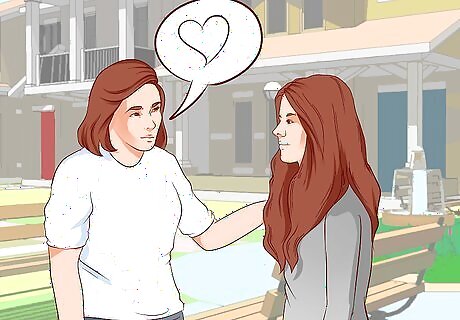
views
- Start by writing your feelings in a private journal to help you understand them. It can help to get everything in your head down on paper.
- If your feelings are romantic or sexual, don't fight them. There's nothing wrong with feeling this way. Try to accept and embrace who you are.
- Get to know your crush better. Try to figure out if she'd be receptive to a same-sex relationship before revealing your feelings to her.
Coming to Terms With Your Feelings

Assess your feelings. Sometimes it's hard to pinpoint exactly how you feel when you're interested in a new person. You may want to spend a lot of time with someone, and think about them a lot, but you're not sure exactly what that means. In order to move forward, you need to understand what your feelings actually are. You need to be able to distinguish between a platonic crush (wanting to be friends) and a romantic crush (wanting to date her). Do you fantasize about kissing the girl or do you just want to spend a lot of time with her? If you simply want to spend time with the girl then you may just have a platonic crush. If you want to be romantic with the girl then you probably have a romantic crush on the girl. Try writing down what is going on with you. This may help you clarify your feelings. Sometimes it can be confusing to figure out the difference between really liking a friend as a friend and having romantic feelings for a friend. Making a list of your feelings can help you figure out if you have a romantic crush or you just want to be best friends with this person. You could also discuss your feelings with a close friend. Tell them about your feelings and ask your friend why you are confused about them.

Know that these feelings are normal. Don't freak out! Just because you have a crush on someone of the same sex it does not make you strange. Instead, it makes you a developing young woman who is getting to know herself and her desires, which is perfectly normal. Know that there are thousands of others out there who have had to deal with the same confusion. Many of them have figured out a solution, and so will you! This is a chance for you to explore your sexual identity. Do some reading about how sexual identity is formed and what happens when people become sexually mature. This should help calm any fears you are having because what you are feeling is perfectly normal.

Accept your feelings. Don't try to fight your natural desires. Instead, accept them and embrace them with pride. It's important to be true to yourself! If you feel like you might potentially be a lesbian or bisexual, consider finding a place in the LGBT community. These are the people who will understand your feelings and give you the support you need. Consider joining a gay-straight alliance at your school or going to a teen group at your local LGBT center. You can even find community online, in forums such as those on emptyclosets.com.

Don't hide these feelings forever. It can be hard to come to grips with a same-sex attraction yourself, let alone letting others know about it. However, willing your feelings to go away or deciding to never let anyone know about them will not make them go away. In fact, hiding who you really are can really impact your relationships and not allow you to fully enjoy the relationships you have with those you love. This doesn't mean that you need to shout about your crush from the rooftops. It just means that you shouldn't keep your crush a total secret. Keeping it a secret implies that there is something wrong with it, which there isn't. If you are hesitant to let a lot of people know, pick a friend to confide in and tell him or her about your feelings. If you think it might be dangerous for you to tell your family or friends that you have same-sex feelings, find a trusted adult or counselor to confide in to get advice. You should always put your safety first. Reader Poll: We asked 378 wikiHow readers how to support a friend questioning their sexuality, and 9% said they would offer to take them to LGBTQ+ events or groups. [Take Poll] While this may not be the best strategy according to our readers, just be yourself! If your friend wants to talk to you about their feelings, listen attentively and ask how you can help.
Acting on Your Crush

Become friends with your crush. Get to know her if you don't know her already. If you have a mutual friend, ask your friend to introduce you to each other. If you don't, find a way to introduce yourself. For example, if she is reading a book you have never read, ask her about it casually. Or if you have a class together but have never talked, strike up a conversation about the class. Basically, find an entry into conversation and try to engage her. If you do know her already, learn more about her. This is a great opportunity to think about whether you really like her romantically or not. This may also give you a chance to learn whether she's open to a same-sex relationship.

Tell her how you feel. It's important to express how you feel honestly and clearly. Perhaps start the conversation by saying, "I have really enjoyed getting to know you" or "I really love spending time with you." Then tell her that you are interested in her romantically. This can be a really hard conversation to have. It may also take a while to build up to this kind of conversation. Make sure that your friendship is on solid ground before trying to take it to the next level. Don't rush it! Take your time and decide when the time is right. If she is sidetracked or in a bad mood, choose a different time to bring up your feelings.

Accept that she may not return your feelings. This can be hard to do, especially if you have a really big crush. However, it is a good idea to be prepared for rejection while at the same time being confident that she may go out with you. This is a balancing act that is important when asking anyone out! The worst-case scenario is that she insults you, puts you down, or makes fun of you. If this happens, don't let it get to you. She obviously is not the type of person you should be in a relationship with. Just know that if this girl doesn't share your feelings it's not the end of the world. There are plenty of other people, men and women, out there for you. If she says no, stay calm. It may be your first instinct to feel hurt and alone. Try to remember to be proud, not ashamed, of your feelings. Be aware that a girl that doesn't return your feelings may tell others about your same-sex attraction. Just be prepared to be outed before you take the plunge with this girl.

Plan a date. If the girl you desire seems open to your advances, whether it is hesitantly or not, make a plan to hang out with her. Don't just tell her you like her and leave the conversation at that. You can ask her to hang out or to go on a proper date. Either way, you don't want to have an opening and not take it! Going to dinner and the movies is a classic first date. You can get to know each other better during dinner but then you can relax while watching the movie. A first date can actually consist of a variety of different activities. Pick something that you know she likes to do. It doesn't have to be super fancy or expensive. It could just be taking a walk in nature or going to the mall together. Whatever she likes, give it a try!
Dealing with the Implications of Same-Sex Feelings

Decide whether to come out. If you ask a girl out, especially if you go to the same school, means that your attraction may become public knowledge. You need to understand this and mentally prepare for this to happen if you want to act on your crush. Think about who is important to you and if those people should hear about your feelings from you rather than from someone else. It can be a hard conversation to have but that can be better than someone hearing it through the grape vine. Coming out doesn't mean that you have to tell everyone or that you have to choose a definite sexual orientation for yourself. For example, you can start simply by telling your best friend that you have this crush and you are not sure what it means about your sexual orientation. Coming out in an area, or in a family, that is not gay friendly can be really difficult. You do need to balance your desire to be your authentic self with concerns for your safety and well being. Above all, make the decision that is right for you!

Cope with an unsupportive family. Your family may not jump for joy that you have a same-sex attraction. It would be so great if they did but most families need an adjustment period before they can embrace this kind of attraction. In order to deal with an unsupportive family you will need to be plan how you tell them and prepare for gradual acceptance instead of immediate excitement. You know your family best, so pick a time when your family members are in a good mood and are open to having a serious conversation. Try to stay calm. Getting upset and yelling at your family that they don't understand won't make them more likely to understand. What will make them more likely to understand is information. Gradually teaching them about the naturalness of same-sex attraction will change their minds more than getting mad and yelling at them. Don't expect the impossible. Some family members will probably always be homophobic. This is very sad but true. Instead, have low and gradual expectations for those that are very, very homophobic to begin with. That way you may be pleasantly surprised at progress instead of disappointed at lack of progress.

Deal with conflicted feelings. Not all the resistance you feel may be coming from the outside. It can be hard to come to terms with having a same-sex attraction if you have been told all your life that it is wrong. In order to deal with internalized homophobia you will need to be very honest with yourself about your feelings and work on accepting them as wonderful and natural. Fighting internalized homophobia is hard and it may take even longer than making your family accept your feelings. Just remember, however, that the end goal of self love and happiness is worth the effort it will take to wipe the bad feelings out of your head. Fighting conflicted feelings may take more than just willing yourself to do it. In many cases is takes a professional, whether it be a counselor, therapist, or other mental health specialist, to help you work through your feelings. These people can help you identify where your negative feelings are rooted and how to eliminate them gradually. Coming to terms with a same-sex attraction can be particularly hard if you continue to be involved with people who do not support your feelings, for example if you continue to be involved in a church that doesn't support same-sex attraction. In this situation you need to make a decision about what is best for you personally. If continued involvement is important to you, then you need to take steps to make sure that what is said about same-sex attraction doesn't hurt you. This could mean a variety of things, from walking away when negative things are said to talking to a therapist about this conflict.



















Comments
0 comment